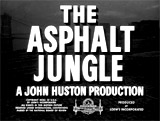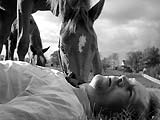
|
The Asphalt
Jungle (1950)
In director John Huston's film noir and crime caper-heist:
- the scene of mastermind criminal Erwin "Doc" Riedenschneider's
(Sam Jaffe) explanation of his proposed robbery - to steal jewels
worth more than $500,000
- the minor memorable cameo role of a blonde, voluptuous
mistress Angela Phinlay (Marilyn Monroe) who was kept by corrupt
lawyer Alonzo Emmerich (Louis Calhern) - to his distaste, she called
him "Uncle Lon" and he called her "some sweet kid"
Emmerich's Mistress or "Niece"
Angela Phinlay (Marilyn Monroe)
|

|

|

|

|
- the realistic depiction of all the criminals and
their motivations in the crime: the three hired crooks: "box
man" (safecracker) Louie Ciavelli (Anthony Caruso), a getaway
driver - hunchbacked diner owner Gus Minissi (James Whitmore),
and a "hooligan" named Dix Handley (Sterling Hayden)
- the actual jewel robbery and the clinically-delineated
details of the tense heist (the hammering through a brick wall, the
nitro bottle with home-made "soup", the alarm system, etc.
)
- the unraveling of the successful robbery due to some
of the crooks being shot (and later dying), and a double-cross

|

|

|
Emmerich with Brannom (Brad Dexter)
The Double-Crossing of "Doc" and Dix
|
- the sequence of "the big fixer" Emmerich's
double-cross (with his own armed private detective Bob Brannom
(Brad Dexter)) of both Dix and "Doc" when he delayed
payment for the jewels and suggested taking possession of the jewels
from "Doc" - at gunpoint
- afterwards, the revelation of Emmerich's corruption
to his wife May (Dorothy Tree), who feared his many associations
with "awful people...downright criminals" - he replied
to her: "Oh, there's nothing's so different about them. After
all, crime is only a left-handed form of human endeavor"
- the scene of Emmerich's alibi (through Angela) revealed
to be a lie; when threatened with arrest, Emmerich retreated to a
side room to write an apology-suicide note to his wife May, but then
he tore up the note into pieces, reached for a gun in the desk drawer,
and committed suicide (the gun-shot was heard off-screen)
- Doc's apprehension by police after he stopped at a
roadside diner during his getaway; he obsessively (and voyeuristically)
leered at a young girl named Jeannie (Helene Stanley), then gave
her a bunch of coins to put in the jukebox ("Play me a tune")
and watched her dance to the music - his delayed departure (he believed
he had "plenty of time") led to his arrest - two policemen
watched him from outside through venetian blinds
- the press conference sequence of Police Commissioner
Hardy (John McIntire) delivering a moralizing speech to reporters
about rampant crime - illustrated by four radio speakers (lined up
in a row) that broadcast crime reports: "...But suppose we had
no police force, good or bad. Suppose we had (he flipped off all
four radios) - just silence. Nobody to listen, nobody to answer.
The battle's finished. The jungle wins. The predatory beasts take
over. Think about it..."
|
Dix's Death in Kentucky Horse Pasture
|

|

|

|
- the final scene of a bleeding Dix Handley stumbling
from his car into Hickory Wood Farm (his father's Kentucky horse
farm lost during the Depression, and his own childhood home) -
he staggered, collapsed and died in a sunny horse pasture amidst
four grazing and nuzzling colts he had dreamed of owning
|


"Doc's" Detailed Explanation of Jewel Robbery

The Tense Heist: "Doc" and "Dix"

Emmerich: "Crime is only a left-handed form of human
endeavor"

Emmerich's Torn Suicide Note




"Doc" Leering at Jeannie Dancing to Jukebox
Music While Police Readied to Arrest Him

Commissioner Hardy (John McIntire)
|











